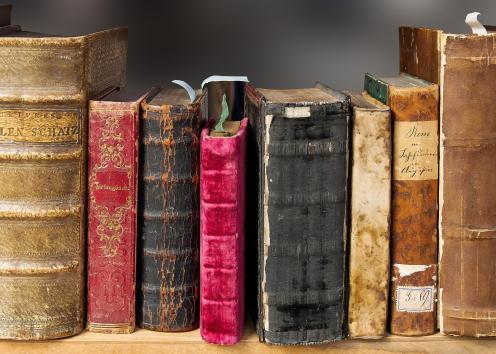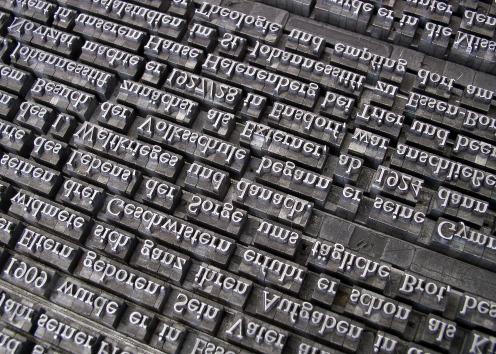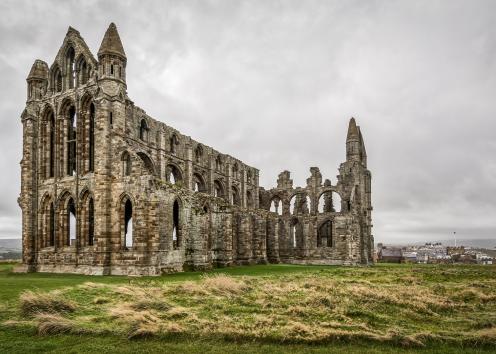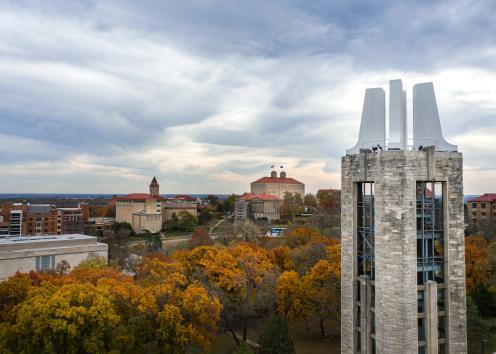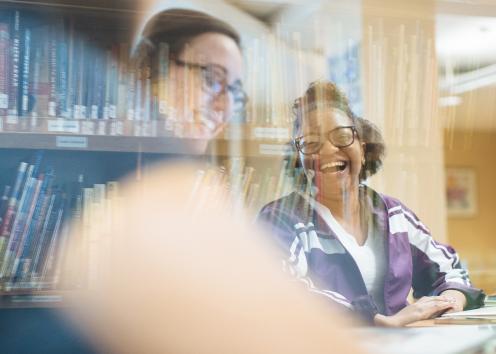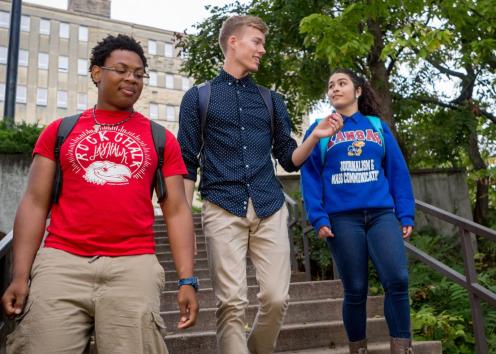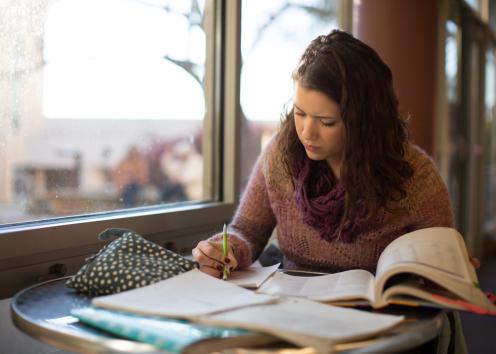Graduate Courses Fall 2026
ENGL 633: Milton
Instructor: Sarah Van der Laan
26391 | TuTh 12:30-1:45 PM | Wescoe 4019
The greatest epic poet in the English language, John Milton (1608-74) was also an early theorist of freedom of the press and a champion of republican liberty against what he saw as the tyranny of increasingly absolutist monarchy. Though Milton dreamed from an early age of poetic greatness, he put his literary career on hold to serve in the government of the short-lived English Commonwealth before defiantly producing his masterpiece from the ruins of the republic and the restoration of the monarchy: a poem fusing Genesis and classical epic, meditations on the nature of good and evil, marriage and the worth of women, the ideal balance of individual freedom and social cohesion, and much more. Discover the young Milton’s early poetry, read selections from his major political and philosophical treatises, and explore the greatest of all English epics, Paradise Lost.

ENGL 709: Critical Theory: Problems & Principles - Animal Studies
Instructor: Phillip Drake
26382 | TuTh 11:00-12:15 PM | Wescoe 4037
This course examines animals in literature along with the emergence of animal studies as a field of inquiry. Embodying a complicated set of interdisciplinary tools and perspectives, animal studies scholarship prompts exploration into the lives of animals, focusing particularly on interactions between human and nonhuman animals. These bodies and relationships provoke complicated and often uncomfortable questions that challenge conventional understandings of a host of issues, including kinship, care, embodiment, individuality, power, precarity, death, extinction, and living well. Furthermore, interactions between human and nonhuman animals often intersect with constructions of gender, race, class, ethnicity, and sex, inviting consideration of justice and social awareness at various scales, from the body and household to the nation and globe. In addition to covering a diverse range of literature, we will explore various disciplinary (literary, anthropological, biological, ethological, psychological, etc.) and theoretical (queer, postcolonial, feminist, existentialist, poststructural, posthuman, ecocritical, etc.) lineages that animate (and are animated by) multispecies studies.

ENGL 751: Fiction Writing III - Graduate Fiction Workshop
Instructor: Laura Moriarty
26392 | M 3:30-6:00 PM | Wescoe 3001A
This is an advanced course for students in the graduate creative writing program. The focus of this course will be on the criticism and discussion of student work. Each student will turn in two to three stories, personal essays, or chapters of a novel-in-progress. Students will also write and present careful criticism of their peers' work. We will also discuss readings, tba.

ENGL 756: Forms - Writing for Young People
Instructor: Giselle Anatol
26265 | Th 3:30-6:00 PM | Wescoe 3001A
In 1973, historian Robert Hine stated: “What society wants its children to know reveals what that society wants itself to be.” Children’s and young adult literature, therefore, becomes a ripe site for exploration of not only how we view young people and what they can understand, learn, and enjoy, but also of how we envision ourselves as a part of a larger community, nation, and world. However, prominent children’s literature scholars such as Jack Zipes and Jacqueline Rose have asserted that children’s books transmit conservative cultural values and encourage readers to accept and perpetuate mainstream models of behavior. They argue that, like early texts that were overtly didactic, even contemporary literature that appears to be radical is inherently orthodox and moralistic. The narratives selected for study in this
course cover a range of genres and time periods to give us a variety of angles to consider the topics of entertainment, instruction, education, and moralizing in children’s and young adult (YA) literature. We will reflect on the results of stark punishments versus natural consequences; whether these texts inspire social change or curtail the desire for it; how genre and the age of the intended audience affect the effectiveness of an author’s message; how notions of childhood and reading audience—including ideas about what children are able to handle (violence, sex, racism, death, etc.)—have changed over time. We will also spend time talking about craft, crafting some creative work, and reading the efforts produced by members of our class.

ENGL 776: American Literature to 1900 - Literature of the American Revolution
Instructor: Laura Mielke & Randall Fuller
26393 | MW 2:00-3:15 PM | Wescoe 4020
250 years ago, the Declaration of Independence was composed, signed, published, and read aloud across the North American colonies and beyond. In this course, we will closely study the Declaration as a work of literary as well as political import and take up a range of contemporary texts that inspired or were inspired by the Declaration. As we read, we will ask: What does it mean to write and speak a nation into being? How has the Declaration been interpreted, by whom, and why? What impact has the interpretation of the Declaration—and in particular, its insistence that “all men are created equal”—had on national culture (as well as politics)? Ultimately, we will not only look at the intellectual and social contexts from which the Declaration arose, but also the ways in which the Revolutionary Era speaks to us now.

ENGL 800: Methods, Theory, & Professionalism
Instructor: Sarah Van der Laan
20558 | Th 2:00-2:50 PM | Wescoe 4022
English 800 prepares students for graduate coursework and exams, the writing of a scholarly thesis or dissertation, and the submission of work to the larger scholarly community. Assignments facilitate the acquisition of skills and tools essential to these activities. Across the Fall and Spring semesters, students will acquire strategies for reading scholarly writing; produce a range of professional genres, including conference proposals; learn more about their selected areas of study and the best venues for sharing work in those areas; and develop a comprehensive plan for their graduate studies. In the Spring semester, in addition to continuing our exploration of methods, we will learn about research resources in English Studies, practice writing conference abstracts, conduct more research on areas of scholarly focus, and further develop individual academic plans.

ENGL 801: Study and Teaching of Writing
Instructor: Sarah Ngoh
26394 | TuTh 9:30-10:20 AM | Wescoe 4022
English 801 aims to support new GTAs’ teaching of first-year writing by providing structured opportunities to reflect on their teaching practices in dialogue with other writing teachers. Over the course of the fall and spring semesters, GTAs will examine perspectives on writing pedagogy that inform their practices in the classroom (from responding to student writing, to facilitating writing groups and peer review, to creating inclusive classrooms, etc.) and will produce their own pedagogical and professional materials, including a research-based pedagogical application, a teaching statement, and a digital teaching portfolio. As such, this course will give GTAs an opportunity to critically examine and reflect on their teaching practices as they work to develop pedagogical approaches that they can build on throughout their teaching careers.

ENGL 980: Seminar in - Judgment & the Human
Instructor: Paul Outka
24036 | W 3:30-6:00 PM | Wescoe 3001A



